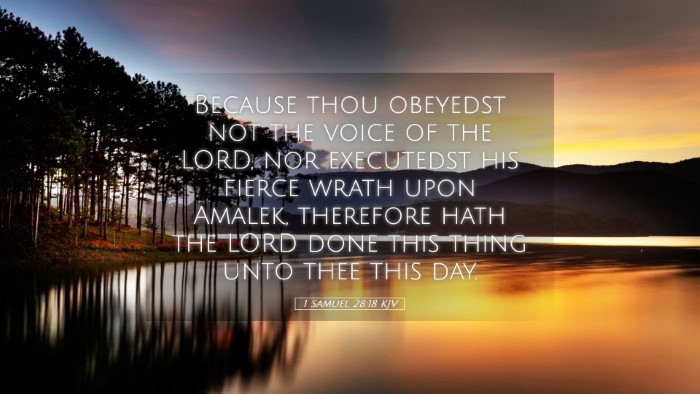Commentary on 1 Samuel 28:18
Verse Context: 1 Samuel 28:18 states, "Because you did not obey the Lord or carry out his fierce wrath against the Amalekites, the Lord has done this to you today." This verse is part of a dramatic narrative where King Saul, in desperation, consults a medium at Endor to seek guidance from the deceased prophet Samuel, illustrating his tragic spiritual decline.
Historical Background
The backdrop of this passage is critical for understanding its theological implications. King Saul, appointed by God, faced the daunting task of leading Israel against its enemies, notably the Amalekites. His disobedience and failure to execute God's command led to God's rejection of him as king, as chronicled in earlier chapters. This moment captures the culmination of Saul's desperate attempt to regain God's favor.
Insights from Commentators
Matthew Henry's Commentary
Matthew Henry highlights Saul's previous disobedience as the primary reason for his downfall. He asserts that Saul's failure to fully destroy the Amalekites, as commanded by God (1 Samuel 15:3), had dire consequences, leading not only to his spiritual alienation but also to the eventual loss of his kingship. Henry notes that God’s judgment is both an act of justice and a divine warning against disobedience.
Furthermore, Henry emphasizes the tragic irony of Saul consulting a medium to seek guidance when he had rejected the counsel of God. This reflects the depth of Saul's despair and his separation from God’s favor. It serves as a sobering reminder to believers of the consequences of turning away from God.
Albert Barnes' Notes
Albert Barnes elaborates on the notion of divine judgment outlined in the verse, interpreting the phrase "the Lord has done this to you today" as a pronouncement of impending doom. Barnes emphasizes that Saul's actions were not compelled by external circumstances but were a direct result of his own choices, showcasing the principle of divine retribution.
According to Barnes, this episode manifests the seriousness of turning away from God's commandments. Saul's consultations with the medium did not yield the divine guidance he sought but rather illuminated his utter spiritual confusion. Barnes cautions against the dangers of seeking wisdom from forbidden sources, which ultimately leads to greater despair and alienation from God.
Adam Clarke's Commentary
Adam Clarke outlines the significance of this verse as reflecting God’s unwavering justice in dealing with disobedience. He posits that Saul’s inability to heed God’s commands has led to an inevitable judgment, manifesting in his tragic end. Clarke discusses the theological implications of God's sovereignty and the moral responsibility of individuals. He emphasizes that God's discipline, though severe, serves as a pathway to understanding His righteousness.
Clarke further engages with the text to highlight the stark contrast between God’s holiness and human failure. By choosing to engage with a medium, Saul not only disregarded God’s law but also demonstrated his profound misunderstanding of the nature of divine authority. This act signals a pivotal moment in Saul's life, marking him as an example of the fatal consequences of disobedience.
Theological Implications
The combined insights of these commentators reveal significant theological themes inherent in 1 Samuel 28:18. First, the danger of disobedience is prominently illustrated. Saul's story is instructive for modern readers—showing that neglecting God’s commands leads to devastating outcomes. Specifically, Saul's consulting the witch at Endor exemplifies the lengths to which desperation can drive individuals when they forsake God's guidance.
Warnings for Believers
- The Cost of Disobedience: Each commentator reiterates that disobedience has consequences not only for the individual but also for the community.
- The Need for Divine Guidance: Reflecting on Saul’s inability to seek God, it is crucial for believers to rely on prayer and scripture rather than worldly wisdom.
- The Nature of God’s Judgment: The finality of God’s judgment is portrayed as both just and sobering, prompting reflection on personal faithfulness to God’s Word.
Conclusion
In summary, 1 Samuel 28:18 serves as a poignant reminder of the dire consequences that come with disobedience to God. The insights from Matthew Henry, Albert Barnes, and Adam Clarke provide a multi-faceted exploration of the text, highlighting themes of divine justice, the importance of obedience, and the dangers intrinsic to seeking guidance apart from God. As ministers, scholars, and students engage with this passage, they are called to reflect deeply on these truths and their implications for their own lives and ministries.


